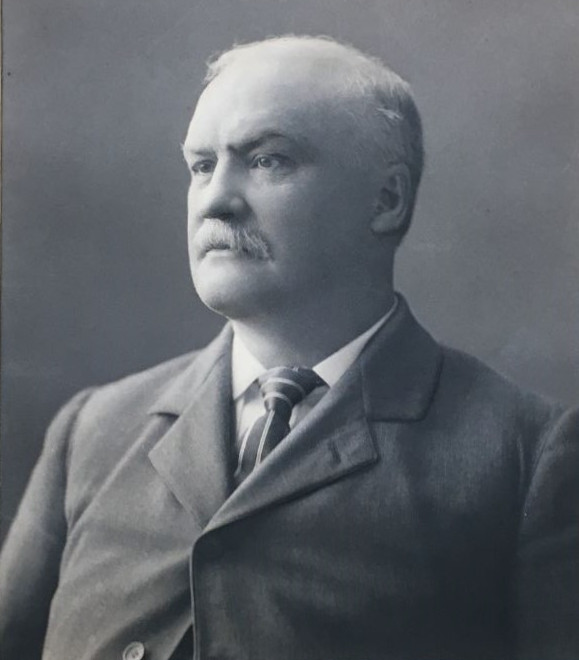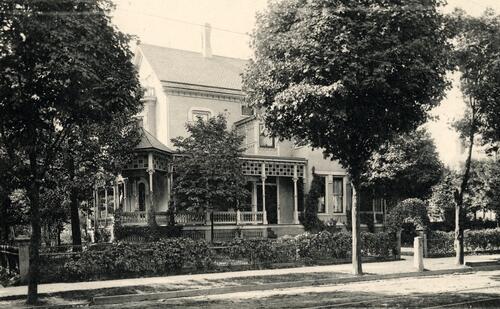

WILLIAMSPORT – J. Henry Cochran was a burly man who’s impact on Pennsylvania and the Lycoming County region has lasted long after his death in 1911.
Cochran owned a home on the corner of Fourth Street and Pine. He was a former state senator, a banker and beloved member of the community.
In the century since his death, he is still remembered most for his namesake the Cochran Primary School on Cherry Street.
The first time Cochran made his mark in Lycoming County can be traced to within days of April 15, 1865. He came to the region to pursue a career in the lumber industry.
Raftsmen on the Susquehanna
On Sunday, April 9, 1865, Confederate General Robert E. Lee surrendered at the Appomattox Courthouse, Virginia, to Union General Ulysses S. Grant and the Civil War came to an end.
On Good Friday, April 14, 1865, while attending a play at Ford’s Theater, President Abraham Lincoln was shot by Confederate sympathizer John Wilkes Booth.
Word of the president’s death reached Lycoming County in the days to follow. According to the Harrisburg Gazette, on Dec. 6, 1911, Cochran and several other raftsmen were transporting logs along the Susquehanna River when an unknown person came out of the woods and “shouted to the raftsmen that President Lincoln had been shot.”
However, “a burly raftsman…expressed satisfaction with the awful crime.” Cochran was not happy about that and took matters into his own hands.
“(No) sooner (had he) uttered his brutal remark, when (J. Henry Cochran) was upon him and hurled him into the swift current,” a newspaper writer said. The unkind raftsman was “pulled aboard and half drowned only after he had apologized.”
Cochran, at the time, was a burly 20-year-old man, who had come to Williamsport, three years earlier. He was born on Jan. 14, 1845, in New Brunswick, Canada. His family then moved to Calais, Maine, where he was educated.
According to the 1911 Harrisburg Gazette article, “At the age of 17, he came to Pennsylvania and was hired to work in the lumber regions. It is interesting to note that Mr. Cochran walked the greater part of the distance from Maine to Williamsport; then a small lumber town.“
Ambitions
As he continued to work for the lumber industry, Cochran was asked to travel to Wisconsin to scout for timber. He had taken a Native American guide with him.
Cochran “plunged into the forest and for weeks traveled through the wilderness of big trees picking out the best tracts. His Indian guide was frequently carried over streams on the shoulders of the powerful young lumberman and (the guide) was visibly impressed with his tremendous strength,” according to the Harrisburg Gazette.
While wandering around the woods of Wisconsin they came to a camp with other American Indians in the midst of an athletic tournament.
“Cochran watched the wrestling, running, jumping and other events and when one big chief was declared the champion, (the guide) induced Cochran to engage the champion.”
The champion was beaten by Cochran but then “the Indians wanted to make Cochran the big chief of the federated tribes, but he had other ambitions and declined.”
One of his ambitions was Avis Ann Rouse, whom he married on July 17, 1870 in Maine. He then returned to Williamsport to pursue his other ambitions. According to the Pennsylvania State Senate website, it was the “lumber business (that) commanded his interests for many years, but in 1883 he became a director of the Lycoming National Bank of Williamsport.”
Pursuing elected office
In 1894, according to Bloomsburg’s Columbian Nov. 9 newspaper, “J. Henry Cochran, Democratic Candidate for State Senator, was elected over C. E. Geyer, Republican, by about 2,700. His majority in this county is 1,316; Lycoming gives him 781; Montour about 300, and Sullivan 250.”
In July 13, of that year, the Columbian newspaper said, “Those who have worked with him at one time or another, are to be found in almost every community in the lumbering districts of the State, and none can be found who would not testify to his uniform fairness, and to his extreme liberality in time of need.”
He still kept his interests in Williamsport. In 1887, Cochran, along with two other men, “formed the banking firm of Cochran, Payne & McCormick.” which was “incorporated as the Northern Central Trust Company” in 1909.
The state senate site mentioned that “Mr. Cochran was identified with many corporations, being president and director of the Susquehanna, Bloomsburg & Berwick Railroad Company, the Pittsburgh, Westmoreland & Somerset Railroad Company, the Lycoming Improvement Company, Lycoming Electric Company, Edison Electric Company… (and the) Byers Allen Lumber Company.”
Cochran was also involved with “various street-car lines as well as a number of land and other companies.” He also “served as president of the Williamsport Board of Trade for several years.”
In that time, he and his family purchased the Rosegill Plantation near Urbanna Virginia, where he and his family would go to vacation and relax.
He continued on in a professional and political capacity. According to reports, he even became a trusted advisor to President Grover Cleveland, who served from 1885 to 1889 and 1893 to 1897.
Caring for the needy
In the early parts of the 20th Century, Cochran played the role of “Santa Clause.” According to the Evening Sentinel, of Carlisle, Cochran had “been distributing Christmas dinners to the needy.” It was estimated he helped feed 150 to 300 families each year.
“He directed that no needy person or family in the city should be allowed to suffer the pangs of cold or hunger at any time,” the Evening Sentinel said.
During the summer his efforts “resulted in the relief of hundreds of sick poor who were unable to procure ice at their own expense.”
For several years at this time, he had been suffering ill health and in 1910, the Altoona Mirror said on Dec. 7, 1911, that “Mr. Cochran had been in poor health for several years and was forced to relinquish his senatorial duties in 1910.”
In late 1911, the Evening Sentinel said that a few weeks before he would take his final trip to his Rosegill estate he arranged for at least two train cars filled with coal be distributed to persons in need in Williamsport.
However, in early December he suffered from pneumonia and on Dec. 6, Cochran died in Virginia. The New York City Tribune stated on Dec. 8, 1911, that “the body of Mr. Cochran reached (Baltimore)…by steamer from Rosegill.” However, there was not “a sufficient interval (of time) to prepare the body for burial before train time, an extra baggage car was attached to the rear of the train for the use of undertakers who began their work as the train pulled out.”
Cochran was praised by the leaders of Williamsport. In the Dec. 7, 1911 issue of the “Gazette and Bulletin” he said he “had the true spirit of Christian charity” in bold letters in a headline announcing his death. At the time, he was called “Williamsport’s foremost citizen.”
“Mayor Samuel Stabler…after expressing regret at the loss the city sustained in the death of Senator Cochran said that as soon as the time of the funeral is known he will issue (a request) that all stores shall close and all businesses be suspended in the city during the funeral,” the article said.
Today, Cochran Primary School remembers Cochran through a display near the school’s gymnasium, with a variety of his photographs. One even features him holding moose antlers to his head. The display showed him as a man with a sense of humor and a joy to be around.
An editorial for the Shamokin Dispatch on Dec. 8, 1911, described that Cochran’s death was a “loss which will be most keenly felt in Williamsport, his home city, where his public enterprise and generous but unostentatious charity are best known. His enviable reputation, however, was not confined to any one locality but was state wide. He ranked as one of Pennsylvania’s foremost citizens and his loss will be deeply and sincerely mourned.”
NOTE: Special thanks to Kirk Felix, principal of J. Henry Cochran Primary School, for the use of a scrapbook.





Mr Smith. Your article was of extreme interest to me as I am a Cochrane descendant Whether I am this man’s relative is debateable My family lived in Cascade, McIntyre, Kellysburg and Ralston, PA.
In my Ancestry, he could be a sibling of my great grandfather, Patrick Cochrane. Would you perhaps have an obituary
My direct ancestors were born in 1810 and later in Lycoming County and White Deer. First born was Tobias Miller Gibbon in 1810. Little is known for sure about his parents except the name of Philip C Gibbon born in 1785.
If you are interested in going backward in Lycoming history I would like correspond with you. Philip’s history is a mystery with multiple origins.
This was the time of the great migration and transition from English census to American census which started in 1790. I have more information I can share if you are interested.
Thank you.